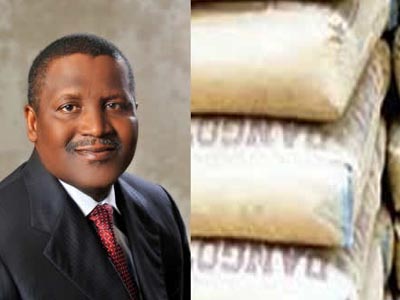
Canvasses concrete road construction for Nigeria
NIGERIA’S Dangote Cement yesterday in Lagos signed a $4.34 billion deal with China’s construction giant, Sinoma International Engineering Company Limited, to build integrated cement plants in 11 countries in the next two years.
The new cement production targets include Nepal (3 million tonnes per annum), Ethiopia (2.5m), Kenya-1 (1.5m), Kenya-2 (1.5m), Zambia (1.5m) and Senegal (1.5m).
Others are Niger Republic (1.5m), Mali (1.5m), Cameroun (1.5m), Cote D’Ivoire (1.5m and Ghana (1.5m). The transaction for the company’s six million-tonne production facilities (the Itori-1 and Itori-2 projects) in Ogun State was also concluded with the Chinese company during yesterday’s ceremony held at Victoria Island, Lagos.
Apart from Nepal, an Asian country, the 10 other host nations, according to the Chief Executive of the Group, Alhaji Aliko Dangote, are in Africa.
He said the new plants, will add 25 million metric tonnes of cement to the firm’s existing 71million-metric-tonne yearly production capacity.
The projects will be built simultaneously between 26 and 28 months, he said, “but all of them will be delivered within 30 months.” Chief Executive Officer of Sinoma, Mr. Shen Jun, signed the agreement on behalf of the Chinese government-backed firm at the event that was also attended by members of the diplomatic corps from the host countries. “Today is a great day for us,” Dangote said, while fielding questions from journalists.
Thanking President Muhammadu Buhari, governments of Nigeria and Peoples Republic of China for the feat, Dangote said the company now targets a cumulative cement production capacity of 100 million metric tonnes in the next five years.
Cement manufacturers in Nigeria, including Dangote and Lafarge, claim to have met local consumption needs but have only managed to achieve minimal reduction in prices through competition, a process that is also driven by Dangote Cement, which has total local production capacity of 20.25mmtpa, from its three existing plants — Obajana (10.25mmtpa), Ibese (6.0mmtpa) and Gboko (4.0mmtpa).
The company plans to ‘escalate’ its local capacity to 37 million metric tonnes ‘soon.’ The progress in local manufacturing and the subsequent cement exports are buoyed by Federal Government’s backward integration policy initiated by former President Olusegun Obasanjo.
The policy gave ‘duty-free’ certificates to select importers over a long period of time, with the hope that they would plough back the benefits into local production.
Nigeria’s cement per capita consumption has arguably remained low at 30 million metric tonnes, meaning that the combined production capacity of all the manufacturers should have addressed the nation’s needs and crash prices locally.
This, however, has remained a subject of controversy between cement manufacturers and consumers, especially in view of the nation’s governance and infrastructure deficits.
On motivation for the company’s expansionist moves beyond Africa, as betrayed by its quest to invest in Nepal, Dangote agreed that the moves were driven by consumption needs.
He, however, stressed that the strategy was not limited to the current market needs but extended to projecting future needs, especially as population growth across Africa has outstripped infrastructure.
Besides, the Dangote Group chief executive advised those that “build and manage Nigerian road infrastructure to do concrete roads rather than bitumen ones.
It will eliminate complaints because you will always go back to repair it after a few years. But, with concrete roads, you have between 30 and 50 years before going back to effect repairs.
It is durable. ‘‘Infrastructure is not commensurate with population (growth) and there would not be infrastructure without cement,” he said, giving further hint about plans to “enter” India and South Americas.
With the Nepal investment and admittance to plans for India, it is believed that Nepal (which is very close to India) is strategic for the Asian market. “We are looking at other opportunities in Africa and beyond,” Dangote confirmed. ‘We are looking at countries where there is need; we won’t go where there is no need.”
According to him, the Group moved against the turmoil in the world to sign these transactions. ‘‘But without the support of the Federal Government that made this day possible, we would not have been able to do this; we thank President Buhari and the Federal Government for making this day possible. Today, we have gone far away to Nepal to build cement factories.”
He further assured that “Africa will not lack Cement anymore in the future, as his company would continue to push the continent towards self sufficiency.’’
He further disclosed that the company’s operations, together with the new ‘onshore and offshore’ investments had created 25, 000 jobs across Africa. The figure, he said, would increase with new investments.



